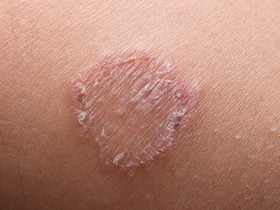Both folliculitis and psoriasis are skin disorders. Although they have quite different causes and treatments, they do have some similar characteristics and may even coexist.
You could be unsure if you have one of these disorders if you’ve observed a rash or skin discoloration. The distinctions between psoriasis and folliculitis, how to recognize them, and what additional skin conditions you might be suffering are all covered in this article.
What Is Psoriasis?

A persistent autoimmune condition that affects the skin is psoriasis. It causes skin cells to rapidly accumulate. Psoriasis symptoms may also include:
- Dry, cracked skin that has raised, red, scaly patches or plaques that may be tiny or broad
- Bleeding skin
- Itchiness
- Burning
- Swollen joints
- Stiffness in the bones and joints
- Thickened, pitted, or ridged nails
Psoriasis is a persistent disease. Although there is no treatment for it, there may be times when your symptoms get better.
The following disorders may be more likely to develop if you have psoriasis:
- obesity
- psoriatic arthritis[1]
- Type 2 diabetes[2]
- metabolic syndrome
- a cardiovascular condition
- High blood pressure
- renal illness
- Parkinson’s condition [3]
- other autoimmune diseases, such as celiac disease or Crohn’s disease
- conjunctivitis, [4] among other eye problems
Nobody knows for sure what causes psoriasis. However, the following may raise your risk:
- Smoking
- Skin damage
- Infections, especially more serious forms
- Obesity
- Stress
- certain medications, such as beta-blockers and antimalarials
- family history of psoriasis
- HIV[5]
The kinds of psoriasis that can resemble folliculitis include:
- Plaque psoriasis, which causes dry, red areas on the skin. Raised, unpleasant, itching areas are possible.
- Guttate psoriasis, which causes skin lesions that are tiny and scaly. This type of psoriasis is brought on by a bacterial infection and typically goes away on its own once the illness is gone.
- Pustular psoriasis is a rare form of psoriasis that results in irritation, fever, chills, and skin blisters filled with pus.
Because all of these disorders can result in patches of tiny, red or yellow spots on the skin, people are more prone to confuse them with folliculitis when they have guttate or pustular psoriasis.













